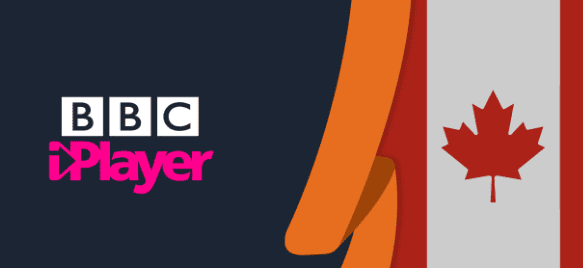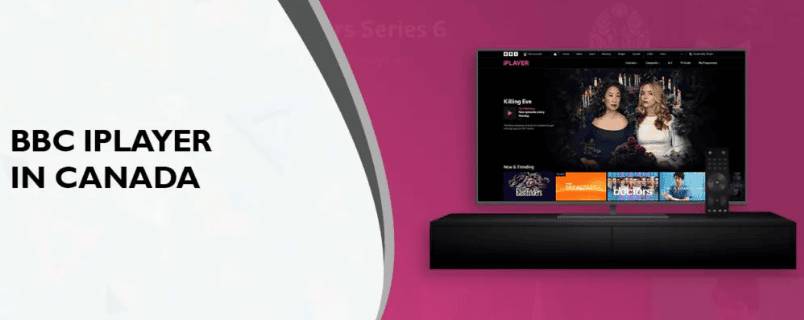One of the simplest ways for users to safeguard their identity and data from prying eyes of law enforcement, internet service providers (ISPs), and hackers is through the use of virtual private networks, or VPNs.
Not only that, but VPNs may also be used to unblock regionally restricted content on streaming services like BBC iPlayer because they allow users to connect to servers all over the world. So, you should be able to stream BBC iPlayer in Canada
Watching movies, TV episodes, and sporting events online has grown increasingly popular thanks to streaming. Many users now use VPNs (Virtual Private Networks) to access content that might not be available in their country due to the growth of streaming apps. So is VPN streaming permitted in Canada? What privacy and data issues are there while using a VPN for streaming?
Streaming Apps in Canada
Numerous well-known streaming services are available in Canada, including BBC iPlayer, Netflix, Amazon Prime Video, Disney+, Hulu and Crave. Every app has a unique offering of material, which might include everything from movies and TV series to sporting events and documentaries.
These apps range in price, with Disney+ costing $11.99 per month and Netflix starting at $9.99. Depending on the material you want to access, Crave provides various pricing packages.
A well-liked app for watching British TV episodes and movies is BBC iPlayer. But only the UK has access to it. Users can view a variety of British TV series and movies, including dramas, comedies, documentaries, and more, on BBC iPlayer in Canada by using a VPN.
If you like to watch British content in Canada, a Trust-worthy VPN will do the job. Helps you to get around the geo-restriction and you can stream BBC iPlayer in Canada. Kindly note that BBC iPlayer is free of cost platform.
Privacy and Data Concerns of VPNs
Both advantages and disadvantages exist when using a VPN for streaming. On the one hand, a VPN can assist you in accessing material that might not be accessible in your nation, such as streaming BBC iPlayer in Canada while abroad.
By encrypting your internet traffic and concealing your IP address from your ISP (Internet Service Provider) and other other parties, it can also safeguard your privacy.By using a VPN, there are, however, privacy and data risks as well.
First off, not every VPN service is made equal; some might gather your data and sell it to outside parties. It’s crucial to pick a trustworthy VPN service that strictly adheres to its no-logs policy and does not monitor your online behaviour.
Second, if you’re watching in HD or 4K, using a VPN may cause your internet connection to lag. This may result in stuttering and other performance problems, which will reduce the fun of your streaming experience.
Using VPNs to Support Content
A virtual private network (VPN) enables access to media that is blocked in your country, such as the BBC iPlayer in Canada. If you enjoy British TV episodes and movies, for instance, using a VPN to access BBC iPlayer can help you support the creators and producers of the content they provide.
Similar to the last example, if you enjoy watching sporting events that are only broadcast in a few countries, utilising a VPN can help you support the broadcasters and sports associations who organise these events.
VPNs are entirely legal in Canada

Like in the majority of other nations, using a VPN is entirely legal in Canada (there are some exceptions, like China, Iraq, North Korea, and the UAE). People use VPNs for a variety of reasons, which can vary from person to person in Canada.
Nonetheless, it is entirely legal for you to do so whether you want to improve your online security, shield your browsing from prying eyes, stream geographically restricted content, or prevent your ISP from restricting your bandwidth when utilising a torrenting VPN.
Why would someone in Canada want a VPN?
Streaming BBC iPlayer in Canada, safeguarding online privacy and security, avoiding bandwidth throttling, and working remotely are the primary reasons Canadians use VPNs.
A VPN lets users alter their virtual location, access geo-restricted content like BBC iPlayer in Canada, encrypt their internet traffic, and disguise their IP address from their ISP and other third parties, making the internet more secure and private.
Which VPN do we suggest for Canadian users?

In terms of cost, features, and overall worth, ExpressVPN surpasses the competition. ExpressVPN has all the features a VPN user in Canada could want for, including servers in nearly 100 nations, exceptional censor-evading power, blazing connection speeds, and dependable access to several streaming services.
Conclusion
In conclusion, using a VPN to stream content is legal in Canada, but it’s crucial to pick a trustworthy company that respects your privacy and doesn’t monitor your online behaviour. By using a VPN, you may stream BBC iPlayer in Canada and other geo-restricted content while also assisting the producers and creators of the media you enjoy.
However using a VPN might also make your internet connection slower, which can cause buffering and other performance problems. It’s crucial to weigh the advantages and disadvantages of utilising a VPN for streaming before selecting a provider that will satisfy your demands and uphold your privacy.



Comments are closed.